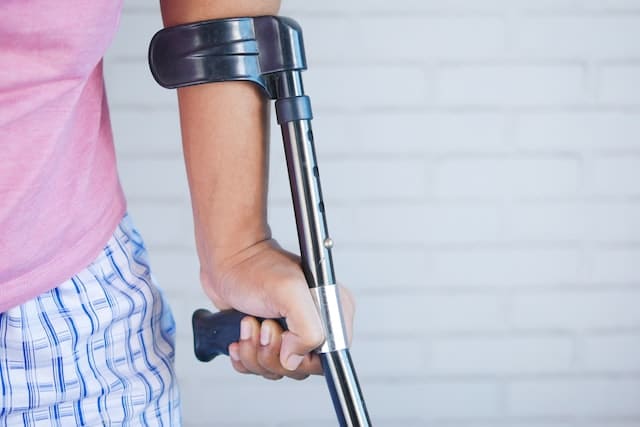
Workplace injuries can cause thousands of dollars worth of damages. Injured employees could face costly hospital bills, not to mention the loss of wages if the injury leaves them unable to continue work. It is the job of the employer to keep their employees safe. When they fail to protect them, workplace injuries occur that can ruin their health and lives. Jobs that naturally lean towards hazardous conditions require extra care on the part of the employer to provide a safe workplace environment. Even though these jobs have a natural chance of harm when working them, employees who sustain injuries can still seek compensation.
Attorney Vickery has spent the last 30+ years fighting for injured employees in Tyler, TX, and the surrounding areas. His expertise and knowledge of workplace injury law have helped his clients obtain the compensation they deserve. His colleagues have called upon him to help mediate in several cases. If you suffered damages as the result of a workplace injury, Attorney Vickery can help you seek proper compensation.
What is a workplace injury?
A workplace injury isn’t just any injury that happens at the workplace. For claims and cases to be viable, the injury must fit a specific set of requirements.
- Injury must occur while on the clock – If you are injured at the workplace, it only qualifies as a workplace injury if you were actively on the clock at the time. Even if you were at your worksite when you were injured, if you were not working at the time, then you would not be able to receive workplace injury compensation.
- Injury must be caused by an event or exposure in the workplace – The workplace, as defined more below, has to be the site where the injury occurred for it to qualify. The workplace can include any location you are required to go to fulfill your job and can include your home if you work remotely.
- The event of exposure is either a new injury or an exposure that significantly aggravates a pre-existing condition – There are two ways an injury at the workplace can be defined. A new injury is a direct result of something that happened at work, such as a broken leg from a falling cabinet. Exposures can also aggravate a pre-existing condition, such as unfiltered air causing a severe asthma attack. It’s important to note that the employee must disclose the pre-existing condition to the employer prior to beginning work for it to count as a workplace injury.
- The employee must not have been partaking in any illegal activity at the time of injury – Any kind of illegal activity on the part of the employee will make their injury ineligible for workplace injury compensation. This includes activities such as drinking on the job, partaking in illegal drugs, and participating in fraud.
In conclusion:
As long as the injury sustained at the workplace follows the above requirements, the injured employee can file for compensation. A workplace injury lawyer can help clients in determining whether their injury is viable or not.
What is the workplace?
The workplace, unfortunately, doesn’t always have a clear-cut definition. In short, the workplace is any physical, on-site location where an employee is required to be or go while working. For many, this narrows down to only the office they work at. But many careers have several locations an employee could be required to visit. Plumbers, for example, may visit a dozen different houses in one day. These locations, as well as the roads used to travel to them, are part of the workplace.
For those who work remote jobs, the home is also part of the workplace. However, injuries sustained in the home are a little harder to justify as a workplace injury. Employers cannot regulate the home environment, nor can they enforce proper safety regulations. Therefore, home injuries have additional requirements to qualify for compensation.
An injury sustained at home needs to be related specifically to the job’s tasks. For example, dropping a filing box on your foot while looking through files for work would count. However, stubbing your toe while grabbing a snack from the kitchen would not. There is, of course, a gray area involving injuries related to the home environment. An employee could, in these cases, be doing a task associated with their job but still be unable to receive compensation. An example would include rushing to answer your phone and tripping over a box of your child’s toys.
Like other workplace injury cases, an injury sustained at home must have occurred while officially on the clock.
Worker’s Comp vs. Personal Injury Lawsuit
When seeking compensation for a workplace injury, there are two ways to go about it. What kind of compensation you’ll be seeking will depend on whether or not your employer carries worker’s compensation insurance. If they do, you’ll be filing a worker’s compensation claim. If they don’t, you’ll need to file a personal injury lawsuit.
Worker’s Compensation Defined
Companies must carry a certain level of insurance for their everyday business needs. In many states, part of this requirement is worker’s compensation insurance. However, Texas does not require a company to purchase this insurance. Certain companies may choose to carry this insurance, especially if the nature of their work is hazardous.
When getting hired, a company is required to disclose whether or not they have worker’s compensation coverage. If they do, they should explain what kind of coverage they have and how one would go about filing a claim. Employers must disclose to their employees if their coverage is discontinued at any time.
Worker’s compensation is the best-case scenario for injured employees. With worker’s comp, all injuries and illnesses are covered regardless of fault. As long as the injury fits within the above scope of a defined workplace injury, employees can expect to see compensation.
To check if your employer has coverage, you can call the Texas Department of Insurance-Workers’ Compensation at 1-800-372-7713.
BE CAREFUL: Many Texas employers carry a workplace injury policy, which often looks like worker’s compensation coverage, but is not. Under these policies, you can still pursue a personal injury claim or lawsuit.
Personal Injury Lawsuit Defined
If an employer does not have worker’s comp coverage, you can still receive compensation for your workplace injury. If you suffer a workplace injury, you can file a personal injury lawsuit against your employer. However, unlike worker’s compensation, the employee must be able to prove that the company or work environment was at fault for the injury or illness.
Examples of company/workplace environment faults include:
– An employer not posting proper health and safety warnings, such as failing to post a warning of hazardous materials
– The workplace not being properly clean, safe, and free of danger, such as a loose railing on a staircase
– Company machinery or equipment that’s not inspected or maintained, such as an elevator that breaks down
Even if your employer has worker’s compensation coverage, you may still be able to file a personal injury claim. There are many different worker’s comp policies, and some provide better benefits than others. If the company or workplace is at fault, a personal injury claim could provide greater compensation. A workplace injury lawyer can help you determine the best course of action when seeking compensation for your injuries.
When to File for Either Claim
No matter which type of claim you’re seeking, there are specific time requirements necessary in order to ensure the claim goes through. In order to apply for compensation, the employee is required to report their injury or illness within 30 days of becoming aware of the problem. It’s not uncommon for certain workplace exposures to lead to health problems in the future. Thus the 30-day time requirement is only started once the employee becomes aware of their injury or illness, such as being diagnosed by a doctor.
If the employee is filing for worker’s compensation, they must file formal paperwork within one year of discover of the injury or illness. Employees have 90 days to appeal the issuance of the first impairment rating. Working with a workplace injury attorney helps you keep your papers organized and ensures that your claims are sent out on time so you can receive compensation as soon as possible.
How to File
Filing for either worker’s compensation or a personal injury claim can be a difficult process to navigate. Even if your employer does explain how their worker’s comp coverage works, it’s not always easy to understand. And trying to make sense of it all while injured certainly doesn’t help.
Working with a workplace injury lawyer can help you navigate the system. Attorney Vickery has processed several worker’s comp and personal injury claims. He knows exactly what information can help process the claim quickly and in a client’s favor. The Texas Department of Insurance has further information on the filing process for worker’s compensation claims.
Benefits Explained
Receiving compensation for a workplace injury entitles the injured employee to three types of benefits: medical, income, and death. Worker’s compensation has a more defined policy when it comes to compensation, whereas a personal injury claim can differ in the type and amount of benefits given. When you file either claim, you’ll need to have records of your costs associated with the injury or illness.
Medical Benefits
Medical benefits are the most common type of compensation given. Most injuries or illnesses will require medical assistance of some kind. Medical compensation can cover a wide range of costs, including:
– Doctor visits
– Hospital stays
– Surgeries
– Medications, both prescription and over the counter
– Nursing aid
As long as the injured employee is able to prove that the costs are related to the injury, they can receive compensation for them. For example, an employee can receive benefits for a hospital visit for a cast for a leg broken on the job. However, they could not receive benefits for their foot bunion removal surgery (unless they could prove the bunion was a result of a workplace injury).
Income Benefits
If the employee sustains an illness or injury that renders them unable to perform their usual duties, they may qualify for income benefits. These benefits cover the wages the employee could expect to receive during their usual work. There are several ways the exact amount of income replacement is determined, and a workplace injury attorney can help you figure out how much you could expect to receive.
In order to receive income benefits, the employee must have proof that they cannot perform their duties due to the injury or illness. Such proof could include a doctor’s note or a fellow employee’s testimony. Employees who receive income benefits from worker’s compensation are often not eligible to receive regular paid leave benefits. However, those receiving income benefits from a personal injury claim may still request paid leave benefits as well.
Return-To-Work Programs after a Workplace Injury
In Texas, return-to-work programs are highly desirable. Getting back to work as soon as possible is not just good for the company, but for the employee too. Reports indicate that employees who participate in return-to-work programs recover faster, maintain their employment, and have a higher average physical and mental health.
Returning to work can look different for each job and injury. Some programs shorten the work time, having an injured employee work part-time to avoid strenuous lengths of activity. Other programs may alter the type of work an employee does. For example, an injured employee may find themselves answering phones or working other desk jobs while they recover.
When and how an employee returns to work will depend on their injury. A program generally requires a medical opinion. As long as a doctor clears the employee for work, the employer strongly encourages participation. In fact, certain worker’s compensation policies stop benefits for an employee who won’t perform light-duty work.
Death Benefits
Death and burial benefits cover the costs associated with the death of an employee. Benefits include funerary costs and income replacement of 75% for surviving family members. Eligible beneficiaries include:
– A surviving spouse
– Minor children
– Children under 25 years of age enrolled in an accredited college or university
– Dependent grandchildren
– Other dependent family members
– Non-dependent parents (if there are no other surviving eligible dependent family members)
Beneficiaries can begin collecting benefits the day after the employee has passed away. However, benefits can cease under certain circumstances for each.
Surviving Spouse (with no dependent children)
A spouse can receive death benefits for the rest of their lives unless they remarry. After they remarry, the spouse will receive a lump sum payment equal to two years of benefits. However, surviving spouses of a first responder can continue to receive death benefits even after remarrying.
Minor Children
Dependent children are eligible to receive death benefits up to age 18. However, if the child attends an accredited college or university full-time, they can receive benefits until age 25. Dependent children with a disability could be eligible to receive benefits until they no longer have the disability. Proof of enrollment or disability is necessary once the child turns 18.
Adult Children
Adult children that are dependents of the deceased employee outside of a physical or mental disability can receive death benefits for 364 weeks. They must prove dependency.
Grandchildren
Grandchildren must have been at least 20% dependent on the employee to receive benefits. Minor grandchildren can receive benefits until they are 18 years of age. Adult grandchildren can receive up to 364 weeks of death benefits with proof of dependency.
Other Dependent Family Members
If no surviving spouse, dependent children, or dependent grandchildren exist, other dependent family members (such as parents or siblings) may be eligible to receive up to 364 weeks of benefits.
Non-Dependent Parents
If there are no dependent family members available, non-dependent parents of the deceased are eligible to receive up to 104 weeks of benefits.
If a deceased employee has no eligible beneficiaries or the beneficiaries cease to be eligible, the remaining benefits of up to 364 weeks are paid to the Subsequent Injury Fund.
Frequently Asked Questions about Worker’s Compensation
Can I appeal the final decision on my claim?
If your claim is denied, you can appeal the decision within 45 days of receiving a verdict. Once the 45 days have passed, the decision becomes finalized. If you were working with the Office of Injured Employee Counsel (OIEC) to file your claim, they will not be able to assist you in your appeal. You will need the help of a workplace injury lawyer.
Can I face firing or punishment if I file a claim?
Texas law prohibits employers from firing or in any other way punishing an employee who files a worker’s comp or personal injury claim. Punishment or harassment could include pressuring the employee to drop the claim, threatening to fire an employee, reducing an employee’s wages, or diminishing the benefits the employee usually receives.
If your employee punishes or harasses you because of your claim, you can work with your workplace injury attorney to take further legal action.
Can other laws or benefits stack with worker’s compensation?
Many workplace injuries open the employee to other laws, such as FMLA and ADA. Receiving benefits from worker’s compensation often leaves an employee ineligible for other benefits the law may provide. In this instance, the injured employee is covered by whichever law or policy provides the greatest level of protection.
Can I apply for unemployment if I have worker’s compensation?
If your workplace injury leaves you unable to work, you can file for unemployment. However, you can only receive unemployment benefits if your worker’s compensation coverage is for impairment income benefits. This means the injured employee must have sustained a permanent, partial disability as a result of their workplace injury or illness.
Rely on Your Workplace Injury Attorney
If you suffer an injury at work, you deserve to receive compensation. Attorney Vickery has over 30 years of experience practicing law in Texas. He has helped injured employees and their loved ones receive benefits to help support them during recovery. The Vickery Law Firm is a kind and compassionate office that fights hard for its clients. After an injury, it’s important to get as much rest as possible so you can recover and return to work quickly. You can count on Attorney Vickery to handle the claim for you, whether it’s a worker’s compensation claim or a personal injury claim. He’ll help you sort through records and submit the required paperwork so you can receive compensation as soon as possible.
To get help with your workplace injury case, call the Vickery Law Firm today at (903) 504-5490 to schedule a consultation.


